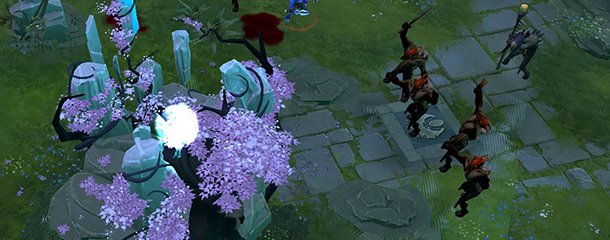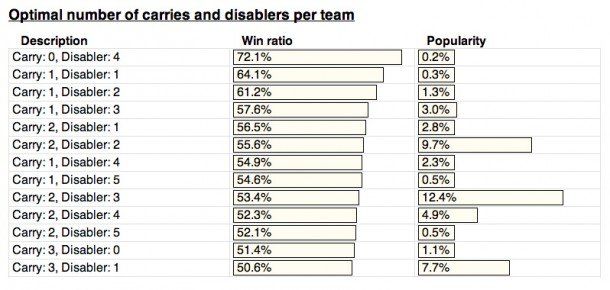Dota 2 data yields ideal team composition

What's the ideal Dota team composition? You might be thinking that the answer is something like a carry, a semi-carry/initiator, a pusher, a support and a disabler, or something along those lines. That would make sense right?
Well, Reddit user KjellJagland wanted to find out for sure, so he turned to good, hard, statistics. He sucked in a bunch of Dota data from stats site Dotabuff , ran it through an open source C# app , and ranked different team compositions according to their win ratios.
The huge number of heroes available in Dota 2 also means an even huger number of potential team compositions -- almost 50 million, to be precise. But plenty of those are only rarely seen, so to smooth out the data, KjellJagland accepted only the team compositions that had more than 50 results to analyse -- a total of 39,626 different combinations.
The results are pretty surprising. Agility heroes fared terribly, with the most successful team composition (successful 54.2% of the time) being four strength heroes and one intelligence hero. That makes a certain amount of sense -- tying a hero's damage output and health pool to a single stat means that you end up with a long-lasting, high-damage team that simply dies less often.

Interestingly, ranged heroes perform consistently better than melee ones. A team with five ranged heroes wins 55.3% of the time, whereas one with five melee heroes has a win-rate of just 42.6%.
But that was just a small deviation from the average. The really weird results came when different hero roles were analysed. These roles were taken directly from Valve's descriptions, so they could take into account a hero labelled as "carry" being played as a support, but that should average out over time.
The most successful number of carries on a team wasn't one. It wasn't two, or even five. It was zero. A team with no carries on it at all tended to win 14.1% more than average.
The biggest gaming news, reviews and hardware deals
Keep up to date with the most important stories and the best deals, as picked by the PC Gamer team.
The statistics for disablers were pretty interesting too. A team with none sucks, losing 6.1% more than the average, but increasing the number brings only small benefits - four disablers on a team is the most successful combination, but it only wins 2.3% more than average. It seems like as long as you've got a few disablers, you'll be fine, but adding loads doesn't help much more.
It makes sense that the more durable heroes you have, the better. Having all five of your heroes marked as "durable" will win you 61.4% of your games, with all other factors being equal. That's for the same reasons that strength heroes dominate the stats -- more health means fewer deaths, and less XP for the enemy team as a result.

The same logic would suggest that a team with lots of escape heroes should do well, but weirdly they don't. A team with none whatsoever should win 7.7% more games than average. It's hard to say why this might be -- KjellJagland suggests in the comments on his Reddit thread that it's because escape heroes tend to run away from fights leaving their friends to die.
I'd add that it might be because using escape mechanisms often requires a degree of skill -- and most of the data here is likely to come from newer players, who don't fully know how to use their abilities. Escape heroes tend to be naturally more squishy, so if they're not using their abilities to their fullest, that'll bring the average down.
Junglers, and nukers don't tend to have much impact on the game, but pushers do -- a team with four pushers will win 11.9% more than average. "running full pusher setups might actually be viable," says KjellJagland. Initiators are powerful too -- a five-initiator lineup should tend to win 61.9% of its matches.
So what does that make the ideal team composition? Well, the very highest win-rates come from a no-carry, four-disabler or one-carry, one-disabler setup, but these have very small popularity ratings (0.2% and 0.3% respectively), so it's possible that success rates are being skewed by outliers - weird games that don't represent "normal" play.

A one-carry, two-disabler team (which represents a larger chunk of test data, 3%) with the other heroes filling out the other roles -- pushing, initiating and support in different combinations is probably best. This team should win 61.2% of its games, again assuming that all other factors are equal.
The very worst? Five carries and three initiators, which will win just 31.9% of its games. That's not an 8-hero team, by the way, almost all heroes are flagged with more than one role.
The lesson you should take away from all of this is that if you're on a public server with three carries already selected on your team, the best thing you can do is play a disabler or a pusher.
Skip Riki this time, take one for the team, and you'll be far more likely to bring home a victory.

